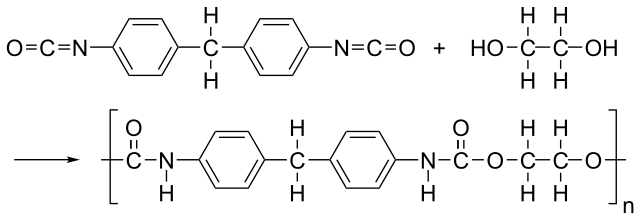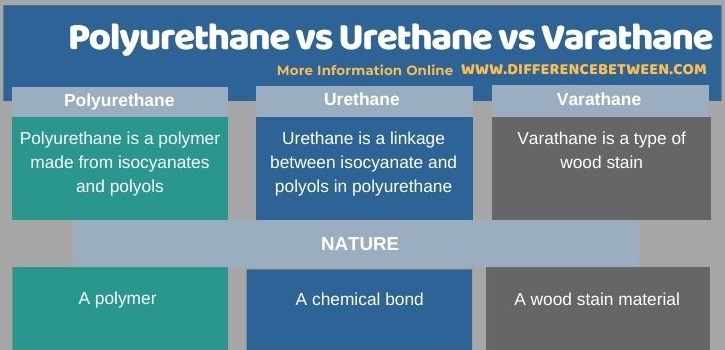Difference Between Polyurethane Urethane and Varathane
The key difference between polyurethane urethane and varathane is that polyurethane is a polymer material and urethane is the linkage between the monomers of the polyurethane polymer, whereas varathane is a type of wood stain.
Although the terms polyurethane, urethane, and varathane sound similar, they are different from each other. Let us discuss below the differences between polyurethane urethane and varathane in this article.
CONTENTS
1. Overview and Key Difference
2. What is Polyurethane
3. What is Urethane
4. What is Varathane
5. Side by Side Comparison – Polyurethane Urethane vs Varathane in Tabular Form
6. Summary
What is Polyurethane?
Polyurethane is a polymer made from isocyanates and polyols. This polymer is different from most other polymer materials because other polymer materials are named depending on the monomers, but this polymer is named because of the urethane linkages repeating throughout the material.
When considering the production of the material, it uses an exothermic reaction between alcohols with two or more functional groups (we call them “polyols”) and isocyanates having more than one isocyanate-reactive group. These two compounds are the monomers of polyurethane. This means there are no urethane monomers in this material.

Figure 01: Synthesis of Polyurethane
There are many important uses of polyurethane. It is mostly used to make flexible foam for mattresses, cushions, etc. Secondly, it is useful for rigid foam production. Furthermore, there are some other uses such as moulded foam formation, elastomer production, for adhesives, sealers, coatings, etc.
There are two forms of polyurethane as aliphatic form and aromatic form. Aliphatic polyurethane or aliphatic acrylic polyurethane is a polymer material that has no aromatic structures. It is important as a coating in industrial and building applications. The chemical structure of this polymer material is important because this material is tough and flexible. Therefore, this material is an additive for many products to get a durable finish. Most commonly, this material is used for sealants and coatings that are intended for outside use.
Aromatic polyurethane is a polymer material containing cyclic, aromatic structures. The structure of aromatic polyurethane differs from aliphatic polyurethane according to the structure of the isocyanate used in the production. If the isocyanate is aromatic, then the polymer material becomes aromatic. The most common aromatic isocyanates are toluene diisocyanate (TDI), diphenylmethane diisocyanate (MDI), and naphthalene diisocyanate (NDI). Here, toluene diisocyanate is usually used as a mixture of two isomers. Often, TDI and MDI are used for the production of thermoplastic elastomers and foams, but their polymeric forms are used for coatings, sealants, and adhesives.
What is Urethane?
Urethane is the linkage between isocyanate and polyols in polyurethane. The name of polyurethane polymer is derived depending on these linkages; “poly” means “many”; thus, polyurethane means many urethane linkages. Unlike many other polymer materials, the polyurethane polymer is named based on the link between its monomers.
What is Varathane?
Varathane is a type of wood stain. There are types of varathane sealers and repair items as well. These items can solve almost all the wood care needs of customers. This substance makes a wood repair very easy. Also, it gives an expert finish, ultimate durability and wonderful clarity, which brings out the beauty of natural wood. The applications of this wood stain include floors, door, furniture, cabinets, trim, paneling, railings, etc.
Polyurethane and varathane are useful in getting a good finish on wood surfaces. However, unlike varathane, polyurethane tends to provide a finish with more gloss. But both these materials are usually transparent, allowing the wood to show its natural beauty.
What is the Difference Between Polyurethane Urethane and Varathane?
Although the terms polyurethane, urethane and varathane sound similar, they are different from each other. The key difference between polyurethane urethane and varathane is that polyurethane is a polymer material and urethane is the linkage between the monomers of the polyurethane polymer, whereas varathane is a type of wood stain.

Summary – Polyurethane vs Urethane vs Varathane
Although the terms polyurethane, urethane and varathane sound similar, they are different from each other. The key difference between polyurethane urethane and varathane is that polyurethane is a polymer material and urethane is the linkage between the monomers of the polyurethane polymer, whereas varathane is a type of wood stain.
Reference:
1. “Urethane”. Pubchem, Available here.
Image Courtesy:
1. “Polyurethane synthesis” By Hbf878 – Own work, remade based on File:Polyurethane.png by zh:User:Cyfer (CC BY-SA 3.0) via Commons Wikimedia
ncG1vNJzZmivp6x7pbXFn5yrnZ6YsqOx07CcnqZemLyue8OinZ%2Bdopq7pLGMm5ytr5Wau268zqWwrqqVqbWiusRmrKudpJ2ur7GMmqWdZaaWv6LAx5qlnmc%3D